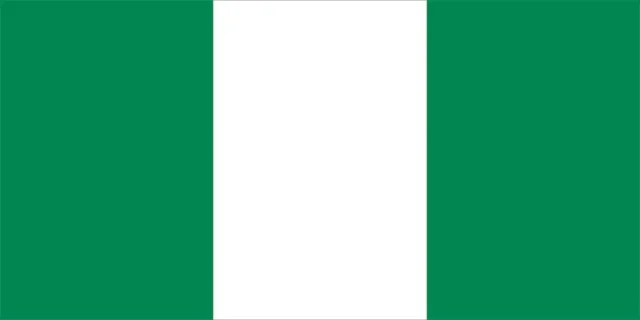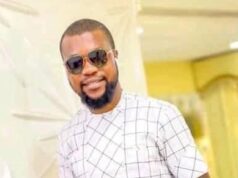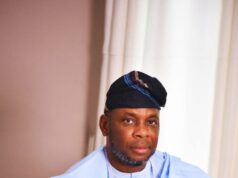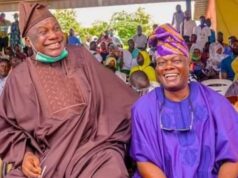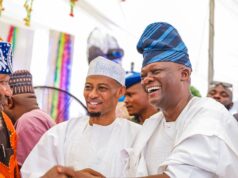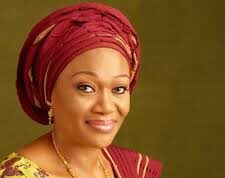
As an active participant in Nigerian politics and a much sought after, public affairs analyst and media practitioner, a day like June 12 – with all the significance it holds for our democracy – should not pass by without some reflections and resolutions. This piece is an attempt to inspire your own reflections and resolutions and hopefully to influence them.
The struggle for the ‘ownership’ of Nigeria is on and the 2023 elections is another engagement of the bidding factions. Which way is it going to fall? For the strategists in this bidding war, there are no party platforms nor ideologies, no personality cults nor permanent friends or enemies, no sectional, regional nor religious baggages, none of these variables matter, except for their usefulness in moving the pawns, deploying the knights and capturing the opponents’ king. In other words, players in this high stake games are ready to use whatever will work to achieve their divide and rule objectives. Nothing is sacred, nothing is respected, as long as it will serve to divide the people. Any party platform will serve, any flimsy and ebullient ideology can be claimed, be it progressivism or conservativism, strong personality cults will be encouraged, regional sentiments will be stirred up and the religious card played, as long as it will get them into power.
The purpose of democracy is the choosing of a popular leader who by virtue of their popularity can mobilize the critical demographic sectors of a nation unto development, wealth creation and prosperity. This is the vision for which one must suppose the likes of Herbert Macaulay, Obafemi Awolowo, Nnamdi Azikwe, Abubakar Tafawa Balewa and more recently, Moshood Kasimawo Abiola, Gani Fawehinmi and Obadiah Mailafia lived and died for, to mention just a few.
But alas, unlike in other climes, elections in Nigeria are not only about choosing the right person to galvanize the nation unto growth and development, it is usually about choosing persons capable of furthering specific agendas. The problem is, these agendas are mostly selfish, parochial, regional and anti-development. Having had a succession of leaders who gleefully served this purpose, Nigeria at 62 is exhibiting all the symptoms of a failed state and some realists (not even pessimists) think we have crossed the Rubicon.
“Crossing the Rubicon”, means that one is passing a point of no return. Its meaning comes from allusion to the crossing of the Rubicon by Julius Caesar in early January 49 BC. His crossing of the river precipitated Caesar’s civil war which ultimately led to Caesar’s becoming dictator for life (dictator perpetuo). Caesar had been appointed to a governorship over a region that ranged from southern Gaul to Illyricum. As his term of governorship ended, the Senate ordered Caesar to disband his army and return to Rome. As it was illegal to bring armies into Italy, the northern border of which was marked by the river Rubicon, his crossing the river under arms was synonymous with insurrection, treason and a declaration of war on the state. It is a point of no return. According to some authors, he uttered the phrase ‘alea iacta est’ (“the die is cast”) before crossing. The question for us is, “is the die cast for Nigeria?” Is Nigeria as we know it today heading for extinction? Are the burden of multiple agendas she had been forced to bear proving too much for her unity and continued existence?
The bidders setting agendas for the ‘ownership’ of Nigeria are not hidden. And if they are hidden, they are hidden in plain sight. They include the northern oligarchs, who want a country for their kith and kin; the retired generals, for whom Nigeria is a cash cow difficult to let go of; the international community, individually and collectively who are greatly benefiting from our inability to harness our natural resources, as well as the brain drain and the capital flights, which are all by-products of our underdevelopment; the big businesses: conglomerates and multinationals are not left out of the game; even some political upstarts, who were fortunate enough to have been elected governors of their home states have banded together to set agendas of their own! It seems the only set of individuals not capable of setting an agenda of their own are the ones who really matter the most: the everyday Nigerians, the patriotic masses whose only interest is leaving a viable and developing country behind for their children born and unborn to live and thrive in.
One major theater of operations in which these bidders have been plying their trade is the 1999 constitution. This piece of document is an aberration, but only regarded as such by those who are sincere about having a strong virile and stable nation. To the bidders, it is Godsent, as it is serving their selfish purpose.
Truth be told, the 1999 constitution ought to have been jettisoned along with military rule. The military as an institution, by necessity rules from the centre. The military high command is threatened by and cannot tolerate strong extremities, the centre must hold all the powers. Hence, they had to produce a document with which they harvested powers from the regions and concentrated everything in the centre. Pretending to speak on behalf of the good people of Nigeria, the document read, “We the people”, when it should have read, “We the military.” Never mind that some civilian collaborators were engaged to perpetuate the aberration. The concentration of powers in the centre stymied Nigeria’s growth and development which was founded on strong regional governments. Weak regions and a strong center works very well for the northern oligarchs in furthering their agenda. Ditto for the retired generals. It also serves the purposes of the neo-colonists and their conglomerates and multinational corporations. The 1999 constitution is the bane of Nigerian democracy. It is the reason good leaders do not emerge or if they emerge, they are soon derailed, once they arrive Aso Rock. For twenty three (23) years, the 1999 constitution had been the headache of those who recognize it for what it is.
One of those who recognize the 1999 constitution for what it is is the nonagenarian, legal luminary, Chief Afe Babalola. He identified the challenge of the 1999 constitution and called for a halt to the present electioneering processes. He proposed an interim government while the challenge is addressed and a return to regular democracy after a better constitution had been installed, but he has been largely ignored. Addressing the 2nd Dr A. A. Esan Annual Lecture organized by the Nigerian Society of Engineers, Ekiti Branch which held in Ado-Ekiti on June 3, 2022, Chief Babalola said, “Our problem is certainly the 1999 constitution.” He then went ahead to propose a new constitution which will enable professionals like doctors, engineers, lawyers and bankers, et cetera, form majority at each House. Much earlier, on May 26, 2021 he had urged the National Assembly to find ways of reawakening and reenacting the 1963 constitution as against the 1999 constitution being contemplated for amendments. He said, “To me, the proposed amendment to the 1999 constitution by the national assembly, whichever way you look at it, is a futile exercise. The truth is that there is no way the national assembly can amend the 1999 constitution to cure inherent defects in the 1999 constitution.” According to the legal icon, the root cause of the nation’s current problems is the 1999 constitution, foisted on it by the military when it was exiting the reign of governance in 1999. But nobody seems to be listening, the electoral process is jolting along at breakneck speed, seemingly without any bumps on the road!
Now that both the All Progressive Congress and the Peoples Democratic Party presidential tickets had been contested and won, the political buzz had tripled and the frenzy seems to be carrying everybody headlong towards the 2023 general elections, the only chance for redemption Nigeria now seem to have is for her people to choose a president who will be willing to divest himself of some of his powers, return most of them to the regions and the people, and tell the bidders that the party is over.
Alhaji Atiku Abubakar and Asiwaju Bola Tinubu hold the presidential tickets of their respective parties and both of them have started making promises. The fourth point on Atiku’s 5-point plan states: Promote a true federal system which will provide a strong federal government to guarantee national unity while allowing the federating units to set their own priorities. Asiwaju Bola Tinubu on his own, had been credited to a statement with the effect that he will decentralize the police. Both seems to be alluding to some form of restructuring but as Nigerians had bitterly found out in the past seven years, talk is cheap.
It might be too early to decide what the presidency of either one of them portends for the obnoxious 1999 constitution. Which one of the two will uphold it and which one will jettison it? Will either one of them be even willing to jettison it? Will the president Nigeria eventually chooses simply jump on the band wagon and take the place of the colonialist?
Alhaji Tanko Yakasai OFR, a human rights activist, former Liaison Officer to President Shehu Shagari and founding member of Arewa Consultative Forum observed, “Paramount and if elected as President of the Federal Republic of Nigeria, Asiwaju’s election victory will signify the complete and total break away from military influence in our polity which will bring about the return of the country to a full fledge democractic tradition and practice for the first time since the return of civilian rule in 1999.”
As the train to the 2023 general elections gathers momentum, both candidates will step up their campaigns and promises. You will hear varying promises on the economy, security, education, even anti-corruption, but none of these will matter much if the 1999 constitution is left untouched! Their foot soldiers will bombard you with messages, videos, posters, billboards, jingles, banners, et cetera et cetera pointing out that one is healthier than the other, less corrupt than the other, older than the other, more religiously fundamental or liberal than the other, invested more in Nigeria than the other, raised many more leaders than the other, knows how to generate wealth more than the other (trust me, I know all the angles, I’m a foot soldier myself!). However, it is the man who sincerely promise restructuring in clear, unambiguous terms, clearly outlines how he intends to go about delivering it that Nigerians should lend the benefit of their votes. Patriotic Nigerians who wants to see a developed Nigeria, who can hold her head up high in the committee of nations, will have to decide which one of the two: Atiku or Asiwaju, is likely to largely abrogate the 1999 constitution, deliver on restructuring and keep Nigeria from crossing the Rubicon unto a failed state.
As things stand, the northern oligarchs may have decided on who to back between the two of them. A source claims the retired generals are not happy with either of them and are going for a third force! Of course they would, if Tanko Yakasai’s assessment is anything to go by. The international community, individually and collectively are weighing their options. A reliable source gave it out that both the UK and the USA are not comfortable with either Atiku or Asiwaju! The conglomerates and the multinationals too are not yet done scheming! And you cannot allow the governors’ forums get under your radar, you can almost smell what they are cooking. It is open season on Nigeria!
For the patriotic Nigerians, the choice will be made on February 25, 2023 (if INEC stays true to the time table), but the decision should have been made long before then. Hope I’ve been able to get you started on the path to making your decision, before we all cross the Rubicon!
Olubunmi Sodipo, a public affairs analyst, media practitioner and politician writes from Ibadan, Oyo State. Instagram: sodipo.olubunmi, Facebook: Sodipo Olubunmi.


